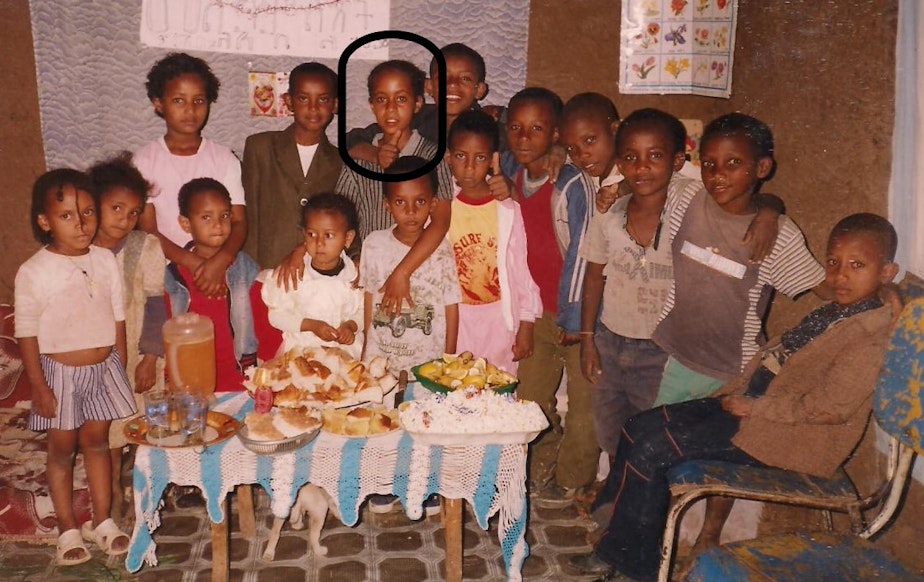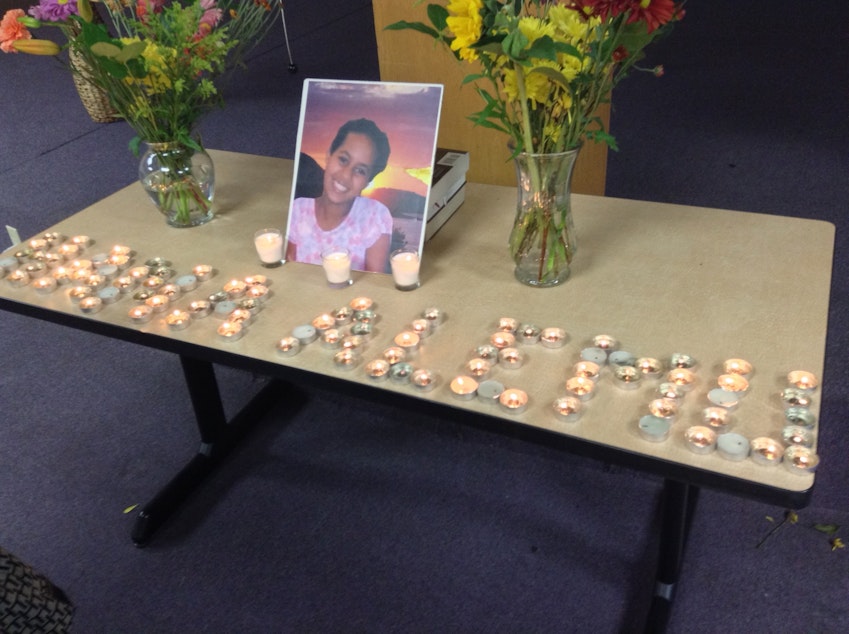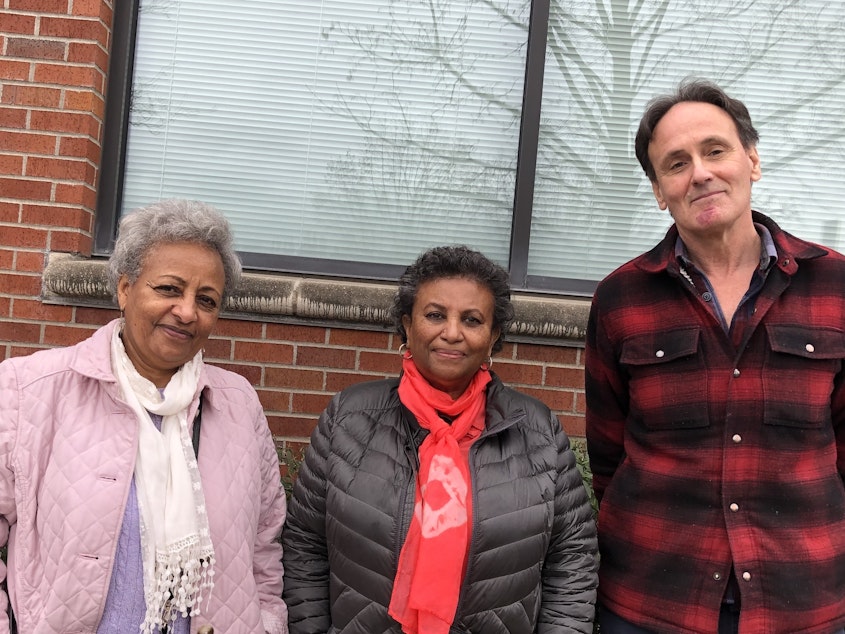Her death shocked Seattle's Ethiopian community. New novel revisits the trial to get her justice

People who recall the Hana Alemu Williams case can’t forget the heartbreaking details of her “homicide by abuse.” Hana had journeyed from Ethiopia to Skagit County to join a new adoptive family, only to be found dead three years later in that family’s backyard.
The writer David Guterson draws on a fictional version of her life and the criminal trials of her adoptive parents in his latest novel, The Final Case. But his family’s real-life connection to Hana, and the response of Seattle’s Ethiopian community to her death, is a compelling story all its own.
Hana Williams, born Hana Alemu, came from Ethiopia in 2008. She was adopted by Larry and Carri Williams. They lived on an isolated property in the town of Sedro-Woolley, and homeschooled their seven biological children with a rigid disciplinary code.
In 2011, Hana was found dead in the family’s backyard, from hypothermia and malnutrition. She was believed to be 13 years old. Her adoptive parents went on trial for manslaughter and, in Carri’s case, “homicide by abuse.”
Washington residents with ties to Ethiopia —including adoptive parents of Ethiopian children — followed Hana’s story with particular concern. One of them was David Guterson, who sat in on the trial in 2013.
“In some regard I think we all felt that just being there would have an impact,” he said. “The judge would have to look out and see that people are paying attention. So just being present and bearing witness, we felt that was one thing we could do.”
Skagit County Superior Court Judge Susan Cook presided over the trial. She’s now retired.
Sponsored
The trial “was very long, it was seven weeks. and it was an ordeal from beginning to end," Cook said.
Most of the testimony about Hana’s life in the U.S. was provided by the other Williams children.
“They were protective of their parents to the extent that they could be, but they didn’t lie for their parents, as near as I could tell," Cook said.
Cook said those children portrayed Hana’s life as one of constant whippings and deprivations, meted out for ostensibly disobeying the family’s rules.
“Hana had to use a port-a-potty. Shut in a closet to sleep. The food she was given was waterlogged sandwiches and frozen vegetables out of the bag. She was beaten,” Cook said.
Sponsored
The treatment culminated in the day of her death, during which she was whipped repeatedly and left outside.
Hana had few opportunities to meet people outside of her adopted family. But Seattle had an extensive Ethiopian community that came together after reports of her death. The nonprofit Ethiopian Community in Seattle (ECS) held a vigil for Hana, and tried to advocate on her behalf.

Mulumebet Retta is the former president of the Ethiopian Community in Seattle and helped lead these efforts. She attended every day of the seven-week trial.
“We had a van and we would drive that every morning and go there to attend the court,” she said. “It was very, very emotional, it was very difficult.”
Sponsored
People in court were weeping and gasping at photos of Hana’s emaciated body — she had lost 30 pounds before she died. Retta said she understood why Judge Cook reminded them to be quiet, but Retta said hearing these details made her want to scream.
Jurors found Larry and Carri Williams both guilty of the charges. At the sentencing, Judge Cook denounced their lack of remorse for Hana’s death. She sentenced Larry to 27 years and 9 months, and Carri to just under 37 years in prison.
Retta said Hana’s supporters in the courtroom visited the girl’s nearby gravesite afterwards, and expressed gratitude for the outcome.
“I was proud to be an American that day,” Retta said. “I was proud of the system, the court, how it handled it, even though she’s from another country, she’s a poor girl, she was adopted.”
And Guterson, who lives on Bainbridge Island, decided to revisit Hana’s story in his new novel. He said growing up with his father as a criminal defense lawyer in Seattle, he always found the courtroom to be a compelling place.
Sponsored
“My first novel, Snow Falling on Cedars, it’s a courtroom drama. And this one is too, for the same reason,” he said. “I’m drawn to the courtroom because it’s a natural place where human conflict plays out.”
The novel features a narrator who is a writer, whose father is a defense lawyer representing a woman resembling Carri Williams. But there’s a lot to Hana’s real-life story that remains outside the novel.
For one thing, Guterson and the Williams family actually used the same local agency to adopt children from Ethiopia, around the same time, and Guterson said his daughter could easily have been in Hana’s place.
“This adoption agency, to advertise ‘available’ children, would, every three or six months, put out a DVD,” he said, featuring the children’s photos and profiles. “And Hana was on the same DVD that the girl we ultimately adopted was on, so I saw her there.”
In addition to Hana, the Williams family actually adopted a second child from Ethiopia at the same time, Immanuel Williams. They were charged with abusing both children. Immanuel was younger than Hana, and he was deaf.
Sponsored
Judge Cook said Immanuel gave gripping testimony against his adoptive parents.
“Immanuel’s testimony was amazing,” she said. “He communicates by sign language which he didn’t even know when he came to the United States. But he was a very strong witness for a child of that age.”
For example, Cook said Immanuel pushed back against the sign language interpreter who said he had been subject to “spanking.” Immanuel said he knew the difference, and what happened to him should be correctly interpreted as “whipping.”
A lot of the concern of the Ethiopian community at the trial was for Immanuel's well-being. Retta, especially, kept in touch with him, even driving to Anacortes to take him Ethiopian food when he was placed with a new family.

Community members also bought a headstone for Hana’s grave that included her birth name, Hana Alemu, only to be told that the Williams family still had the legal right to reject it. Metti Mulugeta is another member of Seattle’s Ethiopian community and an ECS board member who attended the trial. She runs programs to support Ethiopian adoptees and their families.
She said people still make efforts to visit Hana's gravesite in the cemetery in Sedro-Woolley.
“And the nicest thing is other people, when we go there, we see fresh flowers from the neighborhood," Mulugeta said. "That always touched my heart.”
But people stricken by Hana’s death wanted to do more. Guterson offered to travel to Ethiopia, to take a letter and some money from Seattle’s Ethiopian community to Hana’s relatives, who he located through the orphanage.
Once there, Guterson found that Hana’s cousin had a life-threatening medical condition, and needed surgery. This prompted a frenzied effort to obtain a visa and bring her to the U.S.
Swedish Medical Center performed the surgery for free. Mulugeta said it felt good to see something hopeful come out of Hana’s tragedy.
“In a way, I would say it’s a healing for us. In a way it’s just to Hana: ‘we did right by you.’”
Initially Hana’s case seemed to have the potential to chill the close relationships between Seattle’s Ethiopian community and the area’s mostly white adoptive parents.
Susan Denning adopted two daughters from Ethiopia. She lives in Seattle.
“I remember the first time walking back into the Ethiopian Community after that story broke was for that special meeting [about Hana’s death] and I almost felt embarrassed to be there," Denning said. “It was illogical, but it was just a personal response to disbelief.”
Denning said members of the local Ethiopian community at ECS “were as gracious as always, and just trying to figure out how that could possibly have happened.”
Ultimately, she said, “It made us closer in that we had some shared horror and concern.”
Mulugeta said after Hana’s death, ECS redoubled its efforts to welcome and make contact with adoptive families. She said she’s inspired by all the loving adoptive parents she’s met.
“They have gone out to a different culture they have no experience with. They dared to adopt a child,” she said. “Now I’m here, we are here, as resources, to support you if you need us.”
In the big picture, Retta, the former president of the Ethiopian Community in Seattle, and Guterson said Hana’s story had major repercussions in Ethiopia. The country paused international adoptions when Hana died, and ultimately ended them altogether.
Now Retta said people concerned about conditions in Ethiopia, especially in the wake of the current civil war there, are making more efforts to sponsor children. They send money through formal or informal programs that support orphaned children while allowing them to remain close to home with extended family.




